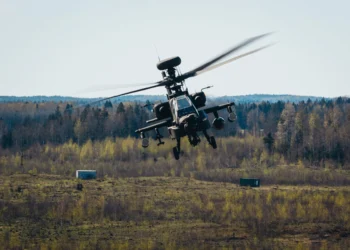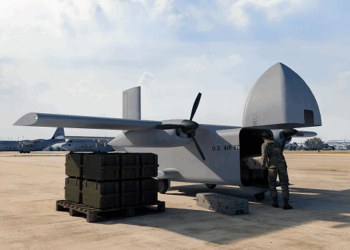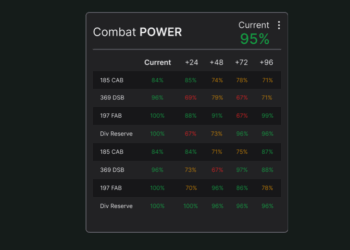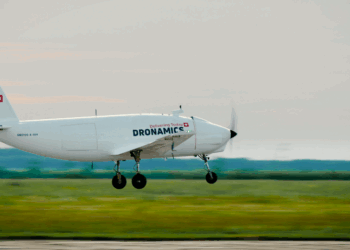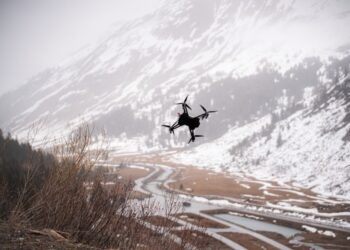Ukrainian Yaroslav Azhnyuk is a serial founder and CEO. In the 2010s, he founded a cloud fintech startup, Fuel Finance, an award-winning design agency, Ozero, and the 2016 Y Combinator backed consumer hardware company Petcube. When Russia invaded his country in 2022 everything changed. He was part of the work in Ukraine that led to the launch of Brave1, Spend with Ukraine, and of D3 Ventures, as well as lobbying the US to release its first aid to Ukraine. He used his experience building hardware with cameras to launch Odd Systems, and realising the importance of autonomy for drones, he founded the AI startup, The Fourth Law. He was awarded the Ukrainian Order of Merit by President Volodymyr Zelenskyy for his work, in particular the launch of Spend with Ukraine.
In this interview, Yaroslav talks about the creation of ‘the iPhone for defence tech,’ and ‘the Uber for munition delivery,’ and the risk to the West if we don’t invest in defence technology. “If you want to keep peace, you have to be armed and prepared.”
I first met Yaroslav Azhnyuk a decade ago for a coffee off Khreshchatyk Street in central Kyiv. He was in his 20s then, founding Petcube – a gadget that lets people watch and play with their pets remotely. He was smart, warm, good company, and into lindy-hop dancing.
When Russia invaded Ukraine, he was the first person I called as I started to check in on my friends around the country. In those earliest days of the war, Yaroslav was at the heart of the tech sector’s rapid response, which involved everything from producing propaganda to helping route refugees out of the country.
He found time to catch up and share his views on defence tech, Ukraine, and more. Here is the interview, which has been edited for length and clarity.
-Dr Tobias Stone, co-founder, Resilience Media
Transcript
Resilience Media: I was just thinking back to when we first met in Kyiv and you were founding Petcube, that was around 2013, right?
Yaroslav Azhnyuk: Yes, then I moved to San Francisco in 2014 for five years. Petcube got accepted into Y Combinator (YC) in 2016, so it wasn’t the reason we moved to the US…we moved there because that’s where our customers were. And we were actually the first Ukrainian company to get accepted to YC.
RM: Then you came back to Kyiv in 2019. What were your plans before the war?
YA: I was CEO at Petcube. There was a lot of work to do at Petcube, and then two other businesses, Fuel Finance and Ozero, were also growing, so I was spending some time on them as well. Then the full scale invasion started, and you know, it changed everything. So I thought, my duty is to protect my country, and I have to do the best that I can to fulfil this.
RM: When I spoke to you when the war started, you said that some of the tech founders had started working on defence very quickly, can you tell me more about that?
YA: Well, obviously the governmental structures are not very fast. So early 2022, myself and a bunch of my friends… we united to reach out to different U.S. Senators and members of Congress to lobby for more weapons to Ukraine, which we like to think may have helped influence the 2022 Lend-Lease Act in some tiny way. And then I also started this project of creating some kind of a hub to coordinate Ukrainian tech innovators in defence with investors, the government, and the army. And I discovered there were a couple of other groups working on something similar, that was late 2022, and that all eventually merged into what now is known as Brave1. Brave1 is a sort of a governmental agency/project office. It’s a very interesting and innovative body. It’s part of the government, but it operates like more of an association, it’s very modern and flexible and nimble. And then also in 2022, I was part of this group which helped to start D3, which is a fund investing in defence in Ukraine.
RM: And then you started working in MilTech more and you set up two more defence tech startups?
YA: Yeah, so in late 2023, I reached the conclusion that the best value I can bring is to solve individual autonomy for drones. So I started The Fourth Law. And then at the same time, I was also talking quite a lot to my partners with Petcube, arguing that we have all of this experience producing over a million cameras and doing mass manufacturing, procurement, and international logistics, and that’s what is needed in Ukraine for manufacturing FPV drones and the different electronics that are needed in mass quantities on the front lines.
And that’s how the idea emerged to build a company which would manufacture the drones and cameras. Odd Systems is a manufacturing company focusing on FPV drones and thermal cameras. So I’m not running this company, but I’m one of the core founders and investors. I have four partners there, and this Fall we launched the first thermal camera of our making, which is more feature-rich than the Chinese cameras in this category, but it’s also less expensive than Chinese cameras. It is quite a feat to beat the Chinese both in price and quality, right out of the door, so that company is showing some good progress.
RM: And on TheFourthLaw why did you feel that autonomy was so important?
YA: Well, I mean, now I feel it is even more important. Inexpensive individual drone autonomy is the single most important defence technology of this decade. Nothing close to that will be done this decade.
RM: Why specifically do you feel the experience in Ukraine has shown that?
YA: Well, first one has to understand the phenomena of the FPV drones. And FPV drones I think are still largely under-appreciated, even in Ukraine, and many times more so outside of Ukraine.
So FPV drones are one of those technologies that comes maybe once a decade, once a few decades, which grows incredibly fast because it is orders of magnitude better at what it does compared to the competition. And I’m talking about FPV drones as applied to military missions, of course. FPV drones have been around for more than a dozen years, and it has been like a hobby. And now in 2022, some of the Ukrainians figured out that if they connect an RPG-7 munition to it and fly it into a tank, they get something that costs $500 which can take out a tank costing $2m to $5m, or something even more expensive, like an entire air defence system, which costs tens of millions of dollars, sometimes hundreds of millions of dollars. Even these simple drones can reach 20, sometimes 30 kilometres away, and can destroy them.
So that technology started seeing first successful use cases in 2022. In January 2023, there were probably just about 1,000 of these FPV drones made per month being used in Ukraine. And within a year, that grew by a factor of 100. So early 2024, there were 100,000 plus FPV drones produced every month in Ukraine. And Russians were catching up as well. And in early 2024, FPV drones were causing up to 80% of casualties and losses across the front line. And that was when Ukraine was starved of artillery shells. So that was something completely unseen, because artillery used to be the god of war for a couple of centuries. Everyone knew that artillery would cause 90% of all the losses.
Now suddenly, out of nowhere, just within one year, going from 1,000 to 100,000 per month, these FPV drones come along. And that’s a huge game changer. And now, as we’re entering 2025, their production rates probably doubled again, so I think we were now at about 200,000 per month.
Here’s what they can do: they can take out infantry; they can take out vehicles; they can take out armoured vehicles; they can do mining and demining; they can do goods delivery; they can do radio repeaters.
You have this one thing that replaces 10 other things and that is much cheaper than each of those things. It basically replaces a Javelin. One Javelin shot costs about hundred thousand dollars and it’s effective in the radius of a few kilometres, whereas an FPV drone has much more manoeuvrability and is effective in a 20 kilometre radius, and it costs… just $500.
FPV drones have effectively become the biggest robotics platform on the planet, there’s no other robot that is produced in bigger quantities than FPV drones. Tesla will produce less than two million cars in 2024. iRoomba, robot vacuum cleaners, just made 1.6 million last year, and the U.S. produced less than one million artillery shells. Ukraine alone produced over two million FPV drones in 2024.
Ukraine alone, with its tiny, tiny economy, produced two million FPV drones. It’s sort of an iPhone of defence technology, it’s the same way as iPhone replaced your MP3 Player and other devices, these drones are capable of replacing some of the Javelins and some of the mortars and some of the long-range artillery and some of the anti-air weapons and so on and so on, and they are becoming a platform.
So with autonomy, it appears it is possible now with the technology that we have to build an inexpensive system which… can be installed on each of those FPV drones and turn them into fully autonomous vehicles, which operate sort of like Uber for munition delivery. You just choose on your mobile app where you are along with your drone and you choose where the bad guys are and you ask the drones to go there and they go, they find the bad guys, you drop a bomb, they return, they land, you can recharge them, you can get the video of the mission accomplished from them and you can send them back to another mission.
And such autonomy, when accomplished and implemented in mass, basically increases the utility and the capability of one FPV drone by a factor of 10,000 times. 10,000 times is a big number, but it’s no joke. When I say 10,000 times, the way I calculate is that currently there are less than 10,000 pilots in Ukraine who can operate a drone. If you don’t need a pilot, just in Ukraine, you can get to a million operators, because that’s how many people know how to operate an AK47. So that’s two orders of magnitude improvement, right? And then the current precision of an FPV drone is about 10%. You won’t be able to get that to 100%, but [with autonomy] 50% to 90% easily. So that’s another half order of magnitude improvement. Then usage, current FPV drones are used as kamikaze. If you’re able to turn them into bombers – and humans cannot bomb because they’re not agile enough, computers are much better at this – one drone on average makes 10 missions instead of one. So that’s another 10 times order of magnitude improvement.
And finally, with autonomy, you’re able to overcome enemy electronic warfare and things like radio horizons, when the targets are hidden behind the radio shadows of forests and buildings and hills. That’s another at least 2x improvement. So here you go at least a 10,000 times improvement just in a tactical usage. And that’s without talking about a more strategic usage, which means these drones can be used on drone carriers autonomously and on sea-based, land-based, air-based drone carriers. And obviously, the autonomy technology can be moved to other more expensive, more sophisticated drones. And then you can also use the autonomy technology for interception of enemy incoming drones, which will also become autonomous after some time. So that’s why I’m saying that autonomy is the single most important defence technology of this decade for sure.
RM: And how how far advanced is TheFourthLaw as a startup?
YA: Pretty advanced. We’ve delivered a few levels of autonomy, a few different products which are being used on the battlefield. We’ve raised a decent amount of capital. We’ve hired an amazing team and I’m pretty sure this year we’ll deliver, at least in some limited forms, complete autonomy, which is what I’m talking about. And I had a chance to… present our developments to [German] Chancellor Olaf Scholz and [Ukrainian] President Zelenskyy, a few weeks ago. Chancellor Scholz asked me when do I think complete autonomy is coming, and I told him that I think it’s coming this year.
RM: Another question that keeps coming up in all the conversations we’re having is what happens to this mil-tech industrial base that’s taking off if the conflict gets frozen?
YA: Whether there is war anywhere on the planet or not doesn’t mean that we don’t need armed forces. So if you want to keep peace, you have to be armed and prepared. These defence technology companies, they do not become unnecessary as the war ends. Arguably the demand might go down, at least the demand from the Ukrainian procurement. But what we’re seeing, talking with our international friends and counterparts, is that over these few years Ukraine has made a very big leap forward and most of this technology that’s being used now is ahead of what is available in the US with the largest military budget on the planet, and there are many parties interested in this technology.
So there’s definitely an opportunity for export, and the export of Ukrainian military technology, I believe it will be open this year one way or another, even if the war continues. So that would mean more revenues for these companies, bigger R&D budgets, and even more innovation.
All of that innovation basically should be seen as investment in making our Western democracies and our rules-based world order stronger. And again, if we don’t do that or if we are doing that slower than the autocracies on the world map, such as Russia, Iran and, China, then we’re doing a disservice to both our ancestors and to our kids, to future generations. We cannot allow that to happen.
Unfortunately now we are seeing that Iran, Russia, and obviously China are ahead of most, if not all, the Western democracies in terms of drone and modern warfare capabilities; asymmetric warfare capabilities. So yes, the United States has the largest air force and the aircraft carriers and so on, but as we saw in the Russian-Ukrainian war, the Russian military was formidable with armour and so much asymmetric methods such as drones, sea drones, and so on, but it did not necessarily mean that their military was the strongest.
RM: And just what do you see happening in 2025, for Ukraine and for you personally.
YA: Well, I think that any kind of peace deal is very unlikely in the first half of the year and is somewhat unlikely in the second half of the year. So it would be…a pleasant surprise if some deal can be reached by the end of this year. I would rather expect 2026 to be the year where a peace deal can be reached. For us, you know, I’ll be focused on delivering further stages of autonomy, talking to a lot of people on the ground, learning about their needs and how they’re using our products; attracting more talent, attracting more capital. So those are key things for me.
RM: Out of interest, what do you think Western allies, people in the tech sector should be doing to help people like you? What are they getting right and what could they be doing better?
YA: Well, they definitely should be spending more time in the Ukraine. So for me, whenever I think about going to some international event, usually the calculus is not in favour of an international event. I feel like I’m spending my time better when I’m working out of Kyiv, not wasting my time on travel and instead talking to the soldiers on the ground and working with my team here.
Definitely more investment, more private capital investments. The amount of investment in Ukraine defence technology has been shamefully low. Part of that might be because investors have a misconception that if they invest in Ukraine, they would have to invest in the legal entity that is established in Ukraine, which is not a fact. 99% of the defence tech companies in Ukraine have their mother companies established outside of Ukraine, in the UK and the US and Estonia and so on. I think there’s, there’s an incredible amount of fantastic deals for private capital investors ready to risk it. And there’s potential for both funds which invest in technology, but also to participate as individual angel investors.
If you’re a defence technology company, I think you have to be here and you have to have at least someone of a VP level constantly living in Kyiv, attending all the events, talking to all the industry players, all the stakeholders because that’s where the future of not just global defence is being formed, but a significant chunk of the robotics that will change dozens of trillion dollar industries in the next decade, a significant amount of innovation for that might come out of the Ukraine defence sector.
RM: How easy is it for a startup to send a VP out to Kyiv to live there?
YA: The best of them, the CEOs have moved here. So I know a couple American companies whose CEOs just moved to Kyiv a year ago and are operating their businesses from here. And they’re seeing this as a huge competitive advantage and they’re not even talking about it that much. And definitely no signs of leaving. And I see more and more CEOs and executives of top American and European companies coming to Kyiv more and more often. There will be this big event in February, which I think everyone should visit, organised by Brave1. So yeah, it’s really very simple. It’s what YC teaches and what Paul Graham always says: ‘talk to your customers, talk to your customers. If you don’t talk to your customers, how are you supposed to build a product that anyone needs, anyone wants?’
RM: Earlier, you were talking about what you’d learned from YC and Petcube that you’ve implemented in defence. What have you learned in the last few years in defence that you would take into your civilian career in the future? How have you changed?
YA: Well, I think the sense of urgency, the sense of urgency and understanding… the urgency when someone’s life is at stake. That’s a very different kind of urgency. And I think one of Stripe co-founders, Patrick Collison, I believe has a page on his own website which is titled FAST where he lists all the projects in human history that were built in remarkably fast timelines like the Empire State Building and like the COVID-19 vaccine… I think that’s a very big takeaway.
And then, you know, there’s this argument that since the advancement in AI can bring the cures of many diseases and so on, there’s an argument to be made that if you’re not doing enough to accelerate the advancement of AI, you’re basically preventing lives to be saved.
But at the same time, like here, if we as European society, as the Western society, if we do not innovate in defence, if we do not invest in defence, then the horrors that we’re seeing in Avdiivka, Mariupol, Bucha, might be happening within 10-15 years, maybe sooner that, in the most of continental Europe. I’m not kidding. That’s not a metaphor. So I think we have an obligation to invest in defence more and to prevent any future which would be bloody and which would be ruled by dictators and tyrants and any kind of nuclear blackmail. The future has to be based on order.
RM: That’s a great place to stop. Thanks for finding the time to talk. Keep safe.



